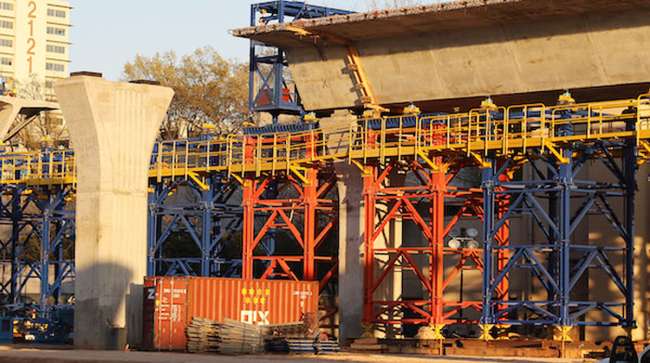Staff Reporter
Trucks, Cars Directed Around Birmingham During Major Bridge Project

A stretch of interstate highway running through downtown Birmingham, Ala., that serves as an important freight route will be closed for about a year for infrastructure improvements.
Construction started in January.
The Alabama Department of Transportation closed a one-mile segment that carries interstates 59 and 20 in order to demolish and replace the route’s bridge system. The portion of interstate that lies between I-65 and U.S. Route 280, known as the Red Mountain Expressway, will be inaccessible until next spring.
ALSO IN ALABAMA: Fuel Tax Hike Coming to Alabama in New Infrastructure Law
Interstate 20 is a major route that runs from Texas to South Carolina while I-59 is shorter, running from New Orleans to Chattanooga, Tenn. They overlap for 150 miles and diverge east of Birmingham. The routes form the primary artery for passenger vehicles and trucks moving through the city, and ALDOT has outlined detours during the construction.
“It is very important for freight movers, but many routes into the city are open from both directions,” said Gary Smith, a Birmingham-area construction engineer for ALDOT. “If they intend to go through the city, I-459 is available as a bypass.”
Stretching about 35 miles, I-459 wraps around the southeastern side of Birmingham. Truckers who need to make deliveries to downtown Birmingham are advised to use the route to circumvent the city and then backtrack.
Alabama Trucking Association spokesman Ford Boswell said the detour has not been the nuisance that the trucking community anticipated it would be because the association and ALDOT were actively spreading the news about the project before construction started in January, giving fleets ample time to prepare. However, he urged haulers to rely on ALDOT’s hotline dedicated specifically to the project, as well as the agency’s Twitter and Facebook sites.
“The caveat is, if there’s an accident on 459, it will bog down,” Boswell said. “If you’re coming through Birmingham, I highly recommend checking these accounts to make sure everything’s free-flowing.”
There are lots of new photos on the 59/20 bridge galleries online. Visit https://t.co/qkjFOrhhzQ to see what's been happening in March. We've also added several new demo shots to the Phase 3 Mechanical Demolition gallery here: https://t.co/2QVJ6qZZYV pic.twitter.com/nBUU2PUPkD — 59/20 Bridge Project (@5920bridge) March 24, 2019
Some trucking companies based along the closed portion of the route have had to make adjustments to their operations. For example, Boswell said that a few Alabama Trucking Association members with businesses have opened temporary yards in more accessible locations.
Although Boswell acknowledged that a variety of freight moves through the area, he identified steel and flatbed hauling as particularly prominent industries in Birmingham.
The construction work is part of a larger project to widen routes, replace bridges and reconfigure interstate ramps in the city. Smith said the I-59/20 bridge is scheduled to reopen by March 20, 2020, although additional lighting and surfacing work will likely still be needed.
The bridges that weave through downtown Birmingham were built in the 1960s and designed to carry 80,000 vehicles per day, according to ALDOT. Today, the spans accommodate about 170,000 vehicles per day, and some 3,400 of them are trucks.
The American Road and Transportation Builders Association estimates 7.4% of Alabama’s bridges are structurally deficient, including the one carrying I-59/20 in Birmingham.
“It’s completely inundated with traffic. It’s aged out,” Boswell said. “It’s a massive undertaking.”




